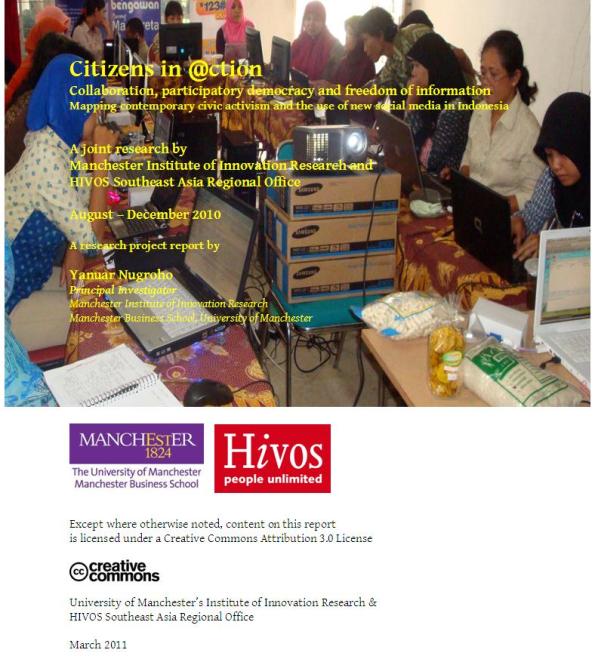Archive
menerawang masa depan di TFSC
 Tulisan saya bersama Ozcan Saritas tentang “menerawang masa depan”, tampil di jurnal bergengsi (bintang 3) Technological Forecasting and Social Change – TFSC (Vol 79 (3) March 2012, Pages 509–529). Tulisan ini adalah analisis lebih lanjut tentang data yang kami gunakan dalam paper tahun 2009 ketika kami menggabungkan Network Analysis dengan foresight. Kalau dalam paper 2009 kami lebih berkutat pada metodologi, maka pada paper ini kami berfokus pada data dan interpretasinya.
Tulisan saya bersama Ozcan Saritas tentang “menerawang masa depan”, tampil di jurnal bergengsi (bintang 3) Technological Forecasting and Social Change – TFSC (Vol 79 (3) March 2012, Pages 509–529). Tulisan ini adalah analisis lebih lanjut tentang data yang kami gunakan dalam paper tahun 2009 ketika kami menggabungkan Network Analysis dengan foresight. Kalau dalam paper 2009 kami lebih berkutat pada metodologi, maka pada paper ini kami berfokus pada data dan interpretasinya.
menjadi editor tamu di Internetworking Indonesia Journal
 Kira-kira pertengahan tahun lalu (2010), Chief Editor jurnal khusus Indonesia “Internetworking Indonesia Journal” (IIJ), pak Thomas Hardjono menghubungi saya. Beliau meminta saya menjadi anggota Technical Editorial Board. Sebuah undangan yang langsung saya sambut dengan antusias (selama ini menjadi reviewer di jurnal lain – mengapa tidak untuk jurnal berorientasi Indonesia? 🙂 ). Lantas tak lama, pak Thomas mengusulkan agar saya dan kolega baik saya, teh Merlyna Lim menjadi editor tamu untuk special issue di IIJ. Sebuah permintaan yang juga langsung saya dan Mer sanggupi.
Kira-kira pertengahan tahun lalu (2010), Chief Editor jurnal khusus Indonesia “Internetworking Indonesia Journal” (IIJ), pak Thomas Hardjono menghubungi saya. Beliau meminta saya menjadi anggota Technical Editorial Board. Sebuah undangan yang langsung saya sambut dengan antusias (selama ini menjadi reviewer di jurnal lain – mengapa tidak untuk jurnal berorientasi Indonesia? 🙂 ). Lantas tak lama, pak Thomas mengusulkan agar saya dan kolega baik saya, teh Merlyna Lim menjadi editor tamu untuk special issue di IIJ. Sebuah permintaan yang juga langsung saya dan Mer sanggupi.
Report: Social media & civil society in Indonesia (updated)
DIPERBARUI/UPDATED 7/5/2011
(English version below)
Beberapa saat yang lalu saya dan mbak Shita Laksmi mempost di blog ini sebuah permintaan tolong untuk berpartisipasi dalam sebuah studi yang dilakukan bersama oleh Manchester Institute of Innovation Research (MIOIR), Universitas of Manchester UK dan HIVOS Netherlands Regional Office Southeast Asia mengenai media sosial dan peranserta sipil di Indonesia. Studi ini telah berakhir dan laporan lengkap bisa didownload di sini. Laporan dalam Bahasa Inggris akan sudah dirilis di MIOIR pada hari Senin 4 April 2011 3-5 sore (silakan daftar lewat email saya) dan di Universitas Salfor hari Rabu jam 2.30-4.30 sore (silakan daftar di sini). Dalam acara rilis laporan tersebut juga akan telah dilakukan pemutaran film dokumenter tentang media sosial dan gerakan sosial di Indoensia, @linimas(s)a, yang juga didanai sebagian oleh HIVOS. Cuplikan film tersebut bisa disaksikan di sini.
Laporan ini diterjemahkan ke dalam bahasa Indonesia oleh mas Aresto Yudo Sujono (@arestoyudo) dan diedit oleh mas BlontankPoer (@blontankpoer). Rencananya, laporan versi Bahasa Indonesia ini akan dirilis -bersamaan dengan pemutaran penuh film @linimas(s)– di Jakarta, 12 Mei 2011 dalam sebuah acara yang diselenggarakan bersama-sama oleh Internetsehat, ICTWatch, WatchDOC, AkademiBerbagi dan HIVOS di Goethe Institute jam 6-9 malam (konferensi pers jam 3-5 sore). Silakan hadir. Versi Bahasa Indonesia laporan Citizens in @ction / @ksi Warga bisa diunduh di sini.
Survey: Internet, social media, dan komunitas sipil di Indonesia

Rekan-rekan sekalian, para pegiat Komunitas/Kelompok/Jaringan/Organisasi Masyarakat Sipil di Indonesia,
Saat ini kami, Yanuar Nugroho dan Shita Laksmi dari Universitas Manchester UK dan HIVOS, ingin mengundang Anda sekalian untuk berpartisipasi dalam survey untuk mengetahui bagaimana komunitas/kelompok/lembaga/jaringan/organisasi masyarakat sipil di Indonesia memanfaatkan teknologi informasi, khususnya internet dan social media. Survey ini ditujukan untuk komunitas/kelompok/lembaga/organisasi bukan perorangan. Cukup satu orang mengisi untuk satu komunitas/kelompok/lembaga/organisasi.
- Pertama, melalui survey online – silakan klik link ini, atau copy and paste-kan pada browser Anda: http://mbs.qualtrics.com/SE?SID=SV_0cEQLkCyokGzZME
- Kedua, melalui form MS-Word. Silakan download di sini dan setelah diisi dan disave, kirimkan kepada saya dan/atau mbak Shita di alamat email kami di bawah.
- Ketiga, melalui form Open Office (ODT). Silakan download di sini dan setelah diisi dan disave, kirimkan kepada saya dan/atau mbak Shita di alamat email kami di bawah.
Localising the global, globalising the local: The role of the internet in shaping globalisation discourse in Indonesian NGOs
 Journal of International Development, Early-cite, DOI: 10.1002/jid.1733
Journal of International Development, Early-cite, DOI: 10.1002/jid.1733
Yanuar Nugroho
Abstract
Globalisation arguably brings about socio-economic development but the distribution of these benefits is unequal. Non-governmental organisations (NGOs), whose growth has often been closely linked with globalisation, have been outspoken regarding this inequality. Despite clear linkages between NGOs and globalisation, there has been little research aiming at understanding how NGOs engage with the issue of globalisation itself. Using the case of Indonesia, this study aims to uncover how NGOs utilise the Internet to respond to globalisation-related issues. NGOs should understand global issues in their local contexts and rearticulate more saliently for their beneficiaries. Technology can serve this purpose when used strategically. Copyright © 2010 John Wiley & Sons, Ltd.
Exploring Knowledge Management in Civil Society Organisations
 Exploring Knowledge Management in Civil Society Organisations: Sustaining Commitment, Advancing Movement
Exploring Knowledge Management in Civil Society Organisations: Sustaining Commitment, Advancing Movement
by Yanuar Nugroho and Mirta Amalia
Manchester Business School (MBS) Working Paper No. 600
Manchester Institute of Innovation Research (MIOIR) Working Paper No. 56
This paper is currently under review in the International Conference of Knowledge Management and Information Sharing (KMIS), part of IC3K (International Joint Conference on Knowledge Discovery, Knowledge Engineering and Knowledge Management), Valencia, Spain 25-28 October 2010, and is being revised for a journal submission.
Abstract
Civil society organisations (CSOs) have recently attracted much research attention, as they have become more central in social as well as economic and political dynamics, challenging and shaping the work of the state/public organisations and of the private institutions. Despite the fact that they are actually knowledge-intensive organisations, CSOs –like any other organisations– are faced with new challenges due to the advent of knowledge economy. Knowledge-capital in CSOs is highly diverse and this affects both the organisational performance and the civil society movement within which they are part of. Most of the knowledge in CSOs that has been driving and characterising civil society activities and realms is tacit in nature and is largely unmanaged. Consequently, in the long run, the organisations and their movement often become unstable despite efforts to manage their activities. We use the works of Polanyi and Nonaka to help address this problem and conceptualise the corpus of knowledge in CSOs. To anchor this conceptualisation, we feature the case of Indonesia where CSOs in a latecomer economy have been significantly influencing the work of public and private sectors. We find that managing tacit knowledge has been crucial to sustain the engagements with beneficiaries and networks. We propose taxonomy to understand different types of knowledge in CSOs and suggest a guiding principle to strategically manage it.
Full paper
available for download from here
Comments are most welcome! 🙂
Knowledge Management in Multinational Subsidiary in Indonesia: A lesson learned
 Last year, among the students I was supervising, was a brilliant student from Indonesia who finally got her MSc with distinction: Mirta Amalia. Her dissertation explored and investigated the ways in which a multinational company susbsidiary devised and implemented the knowledge management strategy. It was a very interesting dissertation. She found fascinating empirical data on the importance of “enabling session” which was arguably vital in the process of tacit knowledge transfer within the company. However, she noted that this scheme was at large at risk as there had been no clear prioritisation.
Last year, among the students I was supervising, was a brilliant student from Indonesia who finally got her MSc with distinction: Mirta Amalia. Her dissertation explored and investigated the ways in which a multinational company susbsidiary devised and implemented the knowledge management strategy. It was a very interesting dissertation. She found fascinating empirical data on the importance of “enabling session” which was arguably vital in the process of tacit knowledge transfer within the company. However, she noted that this scheme was at large at risk as there had been no clear prioritisation.
I can keep on and on and on talking about her dissertation, but I’d better stop here. Contact her directly if you want to read her intriguing dissertation. What I want to say is that the way she formulated and wrote the dissertation was quite sophisticated and I thought the dissertation should not stop there. So I encouraged her to build on that work and write papers.
Incorporating network perspectives in foresight: A methodological proposal
 Foresight (2009), Volume 11(6): 21-41
Foresight (2009), Volume 11(6): 21-41
Yanuar Nugroho and Ozcan Saritas
Abstract
Purpose – A particular feature that makes foresight powerful is its capability to learn from past trends to help guide decision-making for future policy. However, in studying both past and future trends, network perspectives are often missing. Since networks are capable of revealing the structure that underpins relationships between stakeholders, key issues and actions in the past, they are powerful to help envisage the future. The purpose of this paper is to propose a methodological framework to incorporate network analysis in foresight.
Design/methodology/approach – The paper develops a generic framework to incorporate network analysis into foresight’s five stages. Trends identified by respondents of the Big Picture Survey are used to demonstrate how we operationalize this framework.
Weighing impacts of Internet appropriation in Indonesian CSOs
Surman and Reilly (2003) offer a simple framework to understand different extents of Internet use in CSOs by posing three steps in a ‘ladder’, i.e. access, adoption and appropriation. While Camacho’s and Surman’s model offers simplicity to understand different levels that CSOs should use to maximise the benefit of using the ICT, the model proposed by this study provides more details in comprehending the course of actions involved during the innovation-decision process when CSOs (in this instance, Indonesian) adopt the Internet technology until they fully appropriate it. What matters here, empirically, is the impact of such adoption and use on the performance of the organisation. Survey data shows that the overall effect of the Internet use may support the argument that the Internet has been used as a ‘convivial medium’ for CSOs, as concluded by Lim (2003) following Illich’s prophetic vision on human-technology relation (Illich, 1973). Read more…
Teknologi Informasi dan Organisasi Masyarakat Sipil di Indonesia
Studi penggunaan teknologi informasi dan komunikasi di kalangan kelompok/organisasi masyarakat sipil di Indonesia bagi perubahan sosial
DILARANG MENGUTIP.
Studi ini akan terbit sebagai thesis doktoral.
Hubungi saya untuk keperluan kutipan/sitasi tulisan ini.
Download PDF tulisan ini di sini.
Pengantar
Secara umum, studi ini terletak dalam gagasan mengenai ‘studi inovasi’ dan ‘teknologi dan perubahan sosial’. Secara khusus, studi ini mempelajari bagaimana kelompok/organisasi masyarakat sipil (selanjutnya demi hemat kata, disingkat CSO, civil society organisation) menggunakan teknologi informasi, khususnya yang termediasi oleh komputer dan melalui internet (internet-based CMC), untuk mencapai misi dan tujuannya melakukan perubahan sosial.



Recent Comments